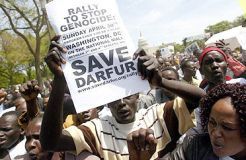US plans to keep pressing on Sudan for UN force in Darfur
June 23, 2006 (WASHINGTON) — The United States plans to keep pressing on Khartoum for an international force in troubled Darfur region, despite fierce opposition from Sudanese President Omar al-Bashir.
 But two years after dubbing the government repression in Darfur as “genocide,” and six weeks after the signing of the Abuja peace accord, the United States has not yet managed to get the international community to budge, while violence rages on, experts say.
But two years after dubbing the government repression in Darfur as “genocide,” and six weeks after the signing of the Abuja peace accord, the United States has not yet managed to get the international community to budge, while violence rages on, experts say.
“I think our diplomacy is going to be consistent,” State Department spokesman Adam Ereli said Wednesday. “It’s based on a strong and unified international consensus, frankly, that the current peacekeeping mission in Darfur must be transitioned to a UN force.”
On Tuesday, Bashir rejected the deployment of an international force for Darfur, declaring that his country would not be “recolonized.”
“The right question should be: Why should international forces come into Darfur; what are the reasons for such an intervention?” Bashir told reporters.
“I swear that there will not be any international military intervention in Darfur as long as I am in power,” he was quoted as telling a meeting of his ruling National Congress.
Up to now, Bashir had appeared to demonstrate a willingness to discuss the issue, particularly since the May 5 signing of a peace accord in Abuja with representatives from the main rebel group in Darfur.
The Abuja accord emerged after nearly two years of negotiations under the aegis of the African Union (AU) and other international organizations.
Deputy Secretary of State Robert Zoellick, the US point man on Sudan, suggested in April there was little way to ram foreign Darfur peacekeepers down Khartoum’s throat.
“You either get the approval of the government, as the government did for the African Union force and the NATO support, or you invade, and that’s a very big, serious challenge,” Zoellick said.
Sudan, Africa’s largest country, has been wracked by near-constant conflict since it was granted independence by Britain 50 years ago.
Since civil war broke out in Darfur in February 2003, the combined effect of fighting and a dire humanitarian crisis has left up to 300,000 people dead and more than two million displaced.
“The UN option is the only option,” said Stephen Morrison of the Center for Strategic and International Studies, who predicts the United States will request a meeting of the UN Security Council on Sudan.
Washington has considerable support for deploying a UN force to the region, including that of UN Secretary General Kofi Annan, Nigerian President Olusegun Obasanjo, the AU, the European Union and NATO, the expert said.
But the support is not unanimous.
“The Sudanese are taking advantage of certain factors. They are able to draw support from within the Arab League, they are able to play their friendship with the Chinese and the Russians in the Security Council, … they are able to play off the fallout of the war in Iraq, … and they are advantaged by the fact that AU itself is divided and is intimidated,” Morrison said.
In a report released Tuesday, the International Crisis Group (ICG) recommended that the UN adopt a binding resolution on the matter.
“The Security Council should authorize deployment of a robust UN force, starting with a rapid reaction component, … by 1 October 2006,” with a clear mandate to “use all necessary means to protect civilians, … including to act militarily as necessary,” the group said.
Other analysts prescribed sanctions for Khartoum.
“It is time to put serious sanctions on the Sudanese government,” said Princeton Lyman of the Council on Foreign Relations. “There will be resistance from China and Russia, but one has to confront them on this issue, because if the Security Council vote a peacekeeping operation and the Sudanese resist, there has to be some reaction from the council.”
(ST)
